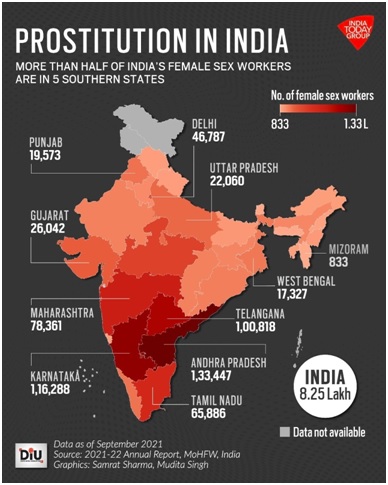

Context
Exercising powers under Article 142 of the Constitution, the Supreme Court asked states and Union Territories to “implement” and “to act in strict compliance of” certain recommendations made by a panel appointed by the court in 2011 on the rehabilitation of sex workers.
Background
- Prostitution is known as the oldest profession in the world. But for a long time, it did not find dignity in Indian society.
- Now, however, the Supreme Court’s new order has brought some light to the dark world of more than eight lakh sex workers in India.
- The apex court not only recognised prostitution as a profession but also instructed the police to neither interfere nor take criminal action against adult, consenting sex workers.
|
Is Indian society ‘actually’ changing?
|
Analysis
What does the court’s order say?
- The sex workers are entitled to equal protection of the law.
- The police are expected to refrain from interfering or taking any criminal action in cases where it is clear that the sex worker is an adult and participating with consent.
- The sex workers should not be harassed, arrested, penalised or victimised by the police.
- Children of sex workers should not be forcibly separated from them and a minor found living with sex workers should not be presumed to be trafficked.
|
Constitutional provisions related to Sex workers
|
What is Prostitution?
- TheImmoral Traffic (Prevention) Act, 1956 defines prostitution as “sexual exploitation or abuse of persons for commercial purposes or for consideration in money or in any other kind”.
Distribution of female sex workers in India
- More than half of the 8.25 lakh identified female sex workers (FSW) in India are from the five southern states — Andhra Pradesh, Karnataka, Tamil Nadu, Kerala, and Telangana.
- Andhra Pradesh has 1.33 lakh sex workers while Karnataka has 1.2 lakh.
- There are 22,060 FSWs in Uttar Pradesh and 46,787 in New Delhi.
- Even in the absence of any legal recognition for sex workers, red-light areas are popular in almost all the major cities, including GB Road in New Delhi, Kamathipura in Mumbai, and Sonagachi in Kolkata.

Understanding the issues faced by sex workers
- Stigmatising: They are easily stigmatised by society.
- Harassment:‘Born into Brothels’, they are subject to harassment by the brothel owners.
- Higher risk of getting infected:Lack of education and awareness puts them at a greater risk of contracting STDs, and stigmatisation against them deprives them of proper health care facilities.
- The fear of being stigmatised prevents them from seeking medical help.
- Exploitation:Sex workers are further prone to exploitation by law enforcement agencies who illegally detain and sexually abuse
- Discrimination against their children:The life of children living in Red Light Areas isn’t easy either. They fall victim to the stigma surrounding their mothers’ jobs and are abused and discriminated against.
What are the pros and cons of decriminalising?
- Benefits
- Better living and earning:Decriminalisation can help them form organisations and cooperatives that can contribute towards increasing their bargaining power and ensuring safe working conditions for them as they won’t have to work alone anymore.
- Confidence to raise the voice:Legalisation can also help them come out of the dark and seek the help of the law enforcement agencies in case of any exploitation during the course of their work.
- Ending stigma:It can prove to be the first step towards ending the stigma surrounding it which in turn can make it easier for sex workers to seek medical help.
- The other side of the coin
- Indecency and immorality.
- Increase in human trafficking: It is also argued that decriminalisation could contribute towards increasing human trafficking as legalising sex work can lead to an increase in its demand which in turn may lead to a rise in trafficking to meet this increased demand.
Wrapping Up
Though the debate around this profession is never-ending, it is important to start giving the needed respect to sex workers, so that, they can live their life with dignity.



